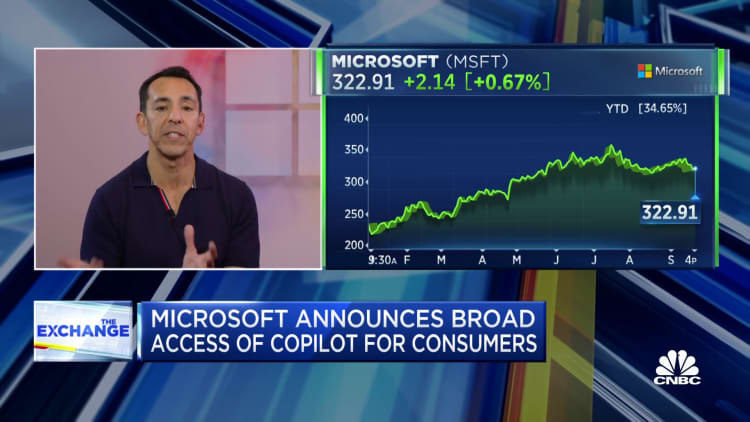Microsoft releases big Windows 11 update with Copilot AI assistant included

[ad_1]
Microsoft’s Windows 11 brings the Start menu to the center of the screen.
Jordan Novet | CNBC
Microsoft on Tuesday said it started rolling out the next major update to its Windows 11 PC operating system. The new version contains a chatbot called Copilot that bears some resemblance to startup OpenAI’s popular ChatGPT.

Copilot is a generative artificial intelligence that can create human-like text and other content with just a few words of human direction. It relies on underlying large language models that Microsoft-backed OpenAI has trained on voluminous sets of data to compose email text, answer questions and automatically perform actions in Windows, augmenting its knowledge with information from websites.
Microsoft upgraded its Bing search engine with a chatbot earlier this year, and now a variation is enhancing the latest version of the world’s most widely used PC operating system. Meanwhile, later this week, the company will start selling the Microsoft 365 Copilot, an AI add-on for corporate workers that use its productivity apps.
PC-specific features in the Windows Copilot include the ability to open apps, switch to dark mode, turn on Bluetooth and get guidance on making a screenshot. While you’re looking at a website in the Edge browser, you can have the Copilot come up with a summary of what’s on the page. On Apple’s Mac computers, people can have conversations with the Siri assistant, but its answers aren’t as detailed as those from Windows Copilot.
Windows 11 now represents about 24% of desktop PCs, according to StatCounter data, while Windows 10, which will be supported until October 2025, controls almost 72% of the market. After that, Windows 11, which debuted in 2021, could become more popular.
“We are seeing accelerated Windows 11 deployments worldwide from companies like BP, Eurowings, Kantar and RBC,” Microsoft CEO Satya Nadella said on a conference call with analysts last week.
Windows remains important at Microsoft, providing one-tenth of total revenue. Microsoft wants to keep Windows relevant because it’s a foundation for the company’s Microsoft 365 productivity applications and a springboard for growth in the Azure public cloud.
Copilot is probably the biggest part of this year’s Windows 11 release. Some people are already using Copilot, by way of a “continuous innovation” release that Microsoft issued in September. The process gives the company a way to provide new features to customers a few times a year, rather than sticking to the previously announced annual schedule.
When you click on the new Copilot icon in the taskbar or hit the Windows+C keyboard shortcut, you can bring up a panel on the right side of your display where you can have a text conversation with the new virtual assistant. It’s meant to be more capable than Cortana, which Microsoft introduced in 2015 with the launch of Windows 10 and has been gradually eliminating.
Here’s a list of some of the other new features of the Windows 11 2023 Update, also known as 23H2:
- A virtual video editor. An auto-compose feature in the built-in Clipchamp video-editing app is making the process of putting together a final video a bit easier, using AI. After you answer a few questions, Clipchamp will prepare a compilation of scenes drawn from your footage.
- Polyglot screen reading. Last year, Microsoft introduced natural-sounding voices that use AI to read text on screen in Windows’ Narrator accessibility feature. The new update adds support for additional languages, including English in the United Kingdom and India, French, German, Japanese, Korean, Mandarin Chinese, Portuguese and Spanish.
- Lower energy bills. Some PCs have built-in presence sensors that can make your display turn off when you walk away and then wake up when you return. A new energy-saving “adaptive dimming” feature can dim your screen when you look away from the display and brighten it up when you look at it again. You can turn this feature on or off when setting up a device with this update or in the Settings app.
- Boot to the cloud. If you have a cloud-based version of Windows, you can log directly into the cloud instance as your primary experience on your PC.
- Smarter snipping. It’s getting easier to pull out text directly from screenshots with Windows. With the updated Snipping Tool app included with Windows 11, you can copy text from a screenshot and quickly redact emails or phone numbers.
- Better backup. Microsoft will let users back up apps they’ve previously installed on a PC to restore them, along with pinned app preferences, in the future.
- Paint with words. In the next few weeks — Microsoft is trying out this feature with testers — the Paint app will receive AI powers. You’ll be able to type in a few words and pick a style, and Paint will create an image according to your description. It’s similar to tools from Adobe and other companies, as well as Microsoft’s own image creator in the Bing search engine.
- More taskbar customization. Windows 11 introduced a stark new taskbar that puts the Start button and a series of app icons in the center at the bottom of the screen. Now you can view app icons with labels, similar to how you could in Windows 10. Even apps that aren’t running can appear with labels. You can also hide the time and date.
- Notepad with memory. Notepad will automatically save your status so that if you close the note-taking app and reopen it, you can get right back to your work.
- Easier picture hunting. Microsoft wizened up the Photos app for Windows 11 so you can type in keywords and objects in the search box to find relevant images stored in OneDrive.
- File recommendations at work. If you’re using Windows 11 on your work computer, the File Explorer and Start menu will start showing suggestions of files you might want to open based on your usage.
- Games right away. Microsoft is starting to test “instant games,” which will let you try playing casual games you find in the company’s Store app without downloading and installing them first. Google tried something similar on Android a few years ago.
- Developer landing pad. The Dev Home app gives software developers a destination for tracking activity on Microsoft-owned GitHub, monitoring PC activity and setting up a new type of PC storage volume called a Dev Drive.
- A home for system stuff. When you click on the “All apps” button in the Start menu, apps that Microsoft considers system components, such as File Explorer, will display a new “system” label. Until now, you could manage them by going to Settings > Apps > Installed apps. Now there’s a dedicated page for them at Settings > System > System components.
Some of these features might not work right away and will appear in the new update over time. For example, the Windows Copilot is still in preview and is only available in North America and parts of Asia and South America. The company wants to expand the feature to other regions in the future.
How to try the new features
If you’d like to get your Windows 11 PC running version 23H2, you can open the Settings app, find the Windows Update section and hit the “Check for updates” button. A blog post has detail on the update for education and commercial customers.
Microsoft will eventually offer the update to your Windows 11 PC. If Microsoft determines that the new update could cause an issue, you won’t be given a chance to install it until everything has been ironed out.
WATCH: Microsoft’s Yusuf Mehdi discusses the tech giant’s AI ambitions with Copilot

Don’t miss these CNBC PRO stories:
[ad_2]